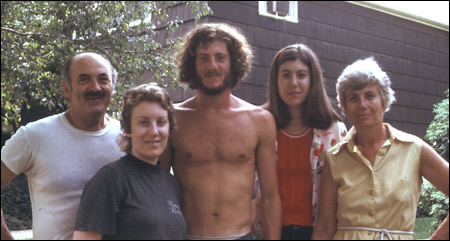The Boston Jewish Film Festival celebrates life as usual
By MICHAEL ATKINSON | October 31, 2006

51 BIRCHSTREET: A a family interrogation that transforms into something like a Wide Sargasso Sea of Jewish-American suburbia. |
When film festivals are programmed as extensions of life, not merely celebrations of cinema, commerce, or hype, everybody wins. Regardless of the percentage of home runs versus dogs, our priorities can be realigned toward the realities of cultural heritage and away from the hot-media laser-sight point that otherwise tries to steer our socio-political vision. Quentin Tarantino and Timur Bekmambetov and Sofia Coppola find no quarter here, and neither does movie stardom or publicity or glossy-monthly otherworldliness. The “being Jewish” wrestled with in the BJFF knows nothing from Jewish gangsters or Jewish superheroes or Jewish vampires — it’s all about the sensible-shoes-on-the-ground grit and warmth of global life as it is now and has been in the last century. Which is to say, history experienced not by rulers but by citizens, something Jews know the way field mice know predator birds.
This year, as in the past and like similar festivals elsewhere, the BJFF revolves to a large degree around the 20th century’s persecutions. Holocaust documentaries may have become a relentless, Oscar-nominated running gag to some, but if we’re lucky they’ll never stop. Every fresh throng of them stings your eyes anew: only five years of industrial mayhem, but more than 50 years, so far, of non-fiction autopsy seems to have barely scratched the skin. Probably another century won’t exhaust the gargantuan web of soul-blasting stories still emerging from witnesses and the material record.
We all have known this well even as schoolchildren, but with each year’s crop of films the pre-adolescent awe returns. An utterly ordinary Shoah Foundation entry, which means it can darken your sky, Mimmo Calopresti’s VOLEVO SOLO VIVERE|I ONLY WANTED TO LIVE (2006; MFA November 12 at 2 pm, with the director) is a prime example: interviewing still more camp survivors in the Lanzmann style, this time attending to the post-Mussolini invasion of Italy and the fate of the more than 6000 Italian Jews shipped out to Auschwitz, Birkenau, et al. Paradigmatically appalling, the testimony of Calopresti’s nine matter-of-fact witnesses, abetted by archival footage, spans years, from Mussolini’s 1938 dictum about “the Jewish problem” to in-camp meetings with Mengele (one of the survivors was the doctor’s Italian interpreter) and the final liberations. These are nine passionate but calm grandmas and grandpas who long ago found ways to tell their stories without melting. The scalding peak moment of Calopresti’s film might be the first-hand account of one man whose job it was to shave women at the entrance to the Auschwitz showers and then help jockey the corpses at an assembly-line pace into the ovens.
 Related
Related:
51 Birch Street, It's a mitzvah, Feel-bad cinema, More 
- 51 Birch Street
Doug Block comes close to poisoning his family interrogation with dreary self-regard and an NPR-ish tone of simpleton obviousness, but the family, as families often do, offer up some prime rib. Watch the trailer for 51 Birch Street
- It's a mitzvah
The Maine Jewish Film Festival’s 10th-anniversary brochure is a glossy foldout suggesting a newer, bigger, better festival to come.
- Feel-bad cinema
This critic's been carping for decades about feel-good cinema, how lousy it makes me feel, and this year I got the misery I begged for.
- Sundance kids?
Phooey on the narrative-film judges at Austin’s 13th South by Southwest Film Festival for bestowing awards on suffocatingly conventional movies.
- Holy spirit
The Russian-Jewish filmmaker Pavel Lungin made his reputation as a post-Soviet Scorsese.
- Loners
What do you give an audience after The Goat , Edward Albee’s 2002 Tony winner about a prize-winning architect sexually bewitched by an animal?
- Fact and fiction and . . .
It’s that time of year again in the City by the Sea, when attention turns from mansions to movie screens.
- Less

 Topics
Topics:
Features
, Entertainment, Movies, Judd Hirsch, More  , Entertainment, Movies, Judd Hirsch, Adolf Hitler, Nazi Party, The Holocaust, Performing Arts, Joan Allen, Quentin Tarantino, Documentary Films, Less
, Entertainment, Movies, Judd Hirsch, Adolf Hitler, Nazi Party, The Holocaust, Performing Arts, Joan Allen, Quentin Tarantino, Documentary Films, Less 